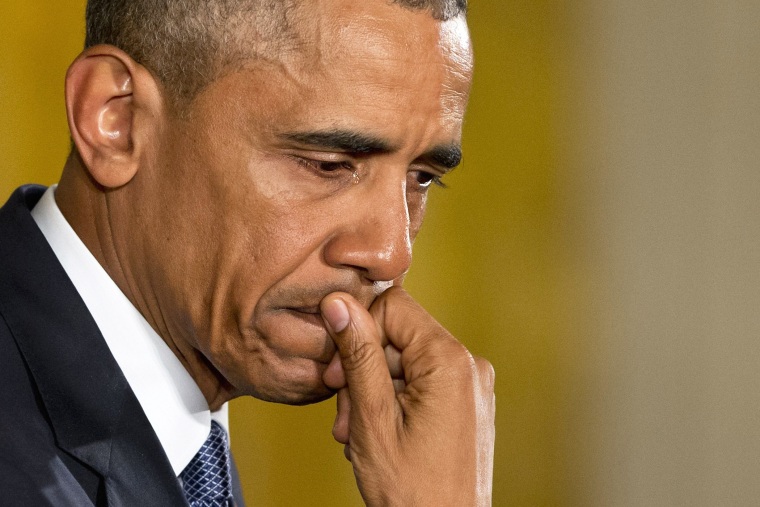President Obama has taken important action toward stemming the tide of gun death in America. As he rightly noted on Tuesday, far too many innocent people suffer predictable and preventable injury and death because of products that are unregulated and readily available. And as a result, we’ve come to a point in the U.S. gun debate, much like we did in earlier generations with cars and cigarettes, where the common good and public safety have become urgent political issues. For this reason, President Obama’s executive action is highly encouraging, because it sends a message that, while the right to bear arms remains indelible and respected for many responsible Americans, it’s become far too easy for people with histories of criminality, domestic abuse, severe mental illness, and even persons on the no-fly list to obtain lethal weapons.
The executive orders that the president announced will make it more difficult for dangerous people to get guns. Among other interventions, the order clarifies the definition of engaged in the business—a term used to determine which sellers are required to obtain federal firearms licenses. This clarification will help law enforcement and prosecutors do what the gun lobby and gun rights proponents have been arguing for: enforce our current gun laws. Tightening this definition will lead to more prosecutions and more convictions, and will stop shady gun sellers from selling guns without background checks.
The president also clarified the definition of a high-volume gun dealer. He took this action because small numbers of private gun dealers have been pouring tens of thousands of firearms into the market each year through direct sales, gun shows, and the internet. To this point these interactions have not required background checks, even though the guns exchanged are responsible for an exceedingly high rate of U.S. gun trafficking and gun crime.
And perhaps most important, these and other actions will expand the types of transactions that require point-of-sale background checks for firearms. Many pro-N.R.A. politicians and pundits wrongly assert that background checks represent the over-reach of a Democratic “gun-control cult” and that expanding the use of the checks “won’t stop terrorists.”
But such claims are highly deceptive. In fact, the background check system stems from the shooting of President Reagan, and was first mandated during a GOP administration as part of the Brady Handgun Violence Prevention Act of 1993. In their current format background checks generally take only a few minutes to complete, and screen for persons whose names appear in federal and state criminal databases. They thus limit gun sales to, for instance, persons who have been indicted or convicted of felonies or have been subject to restraining orders. For these reasons, background checks may or may not impede terrorists—they were not designed as such—but they are undoubtedly effective in stemming the tide of everyday gun violence that kills 33,000 Americans per year. Indeed, data suggests that states that expand background checks see upwards of 40 percent fewer police shot on the job and women shot by their intimate partners, as well as gun suicides, than states that do not. Experts also believe that expanding and strengthening the background check system will lead to fewer mass shootings.
None of these orders will in any way hinder the rights of responsible citizens, the so-called good guys, to purchase as many guns as they wish, or of responsible gun dealers to sell them. Instead, the action will result in more oversight of the oft-hidden economies through which bad guys obtain firearms and use them to commit assaults, robberies, and other crimes. Moreover, the actions will help stem the tide of our national epidemic of gun suicides.
As has been widely noted, the executive orders stop short of measures that the president sought after the mass shooting three years ago, and leave a number of loopholes in place as a result. Yet by taking action now, President Obama ultimately takes aim at a larger target: the learned helplessness surrounding gun crime in America. Over 100,000 Americans died because of gun crime over the past decade. And while no one on any side of the contentious gun debate wishes for such tragedy, we’ve been (wrongly) told time and again that our country is too hopelessly divided and polarized to take action. Perhaps, though, what we’ve most needed to break the deadlock, and the cycles of trauma and tragedy and counterproductive blame to which we’ve become far-too-accustomed, is a bold first-step.
Dr. Jonathan M. Metzl is a professor of Medicine, Health and Society at Vanderbilt University, and research director of the Safe Tennessee Project.
